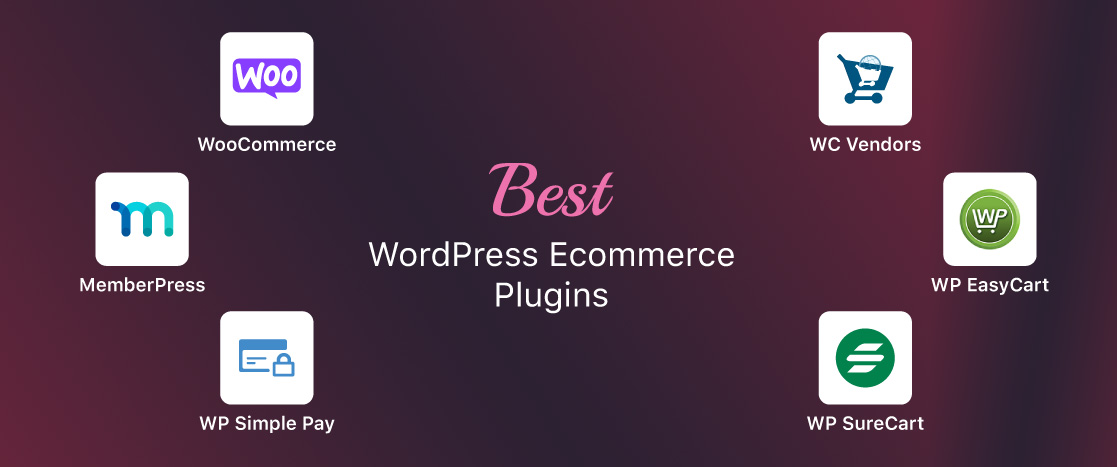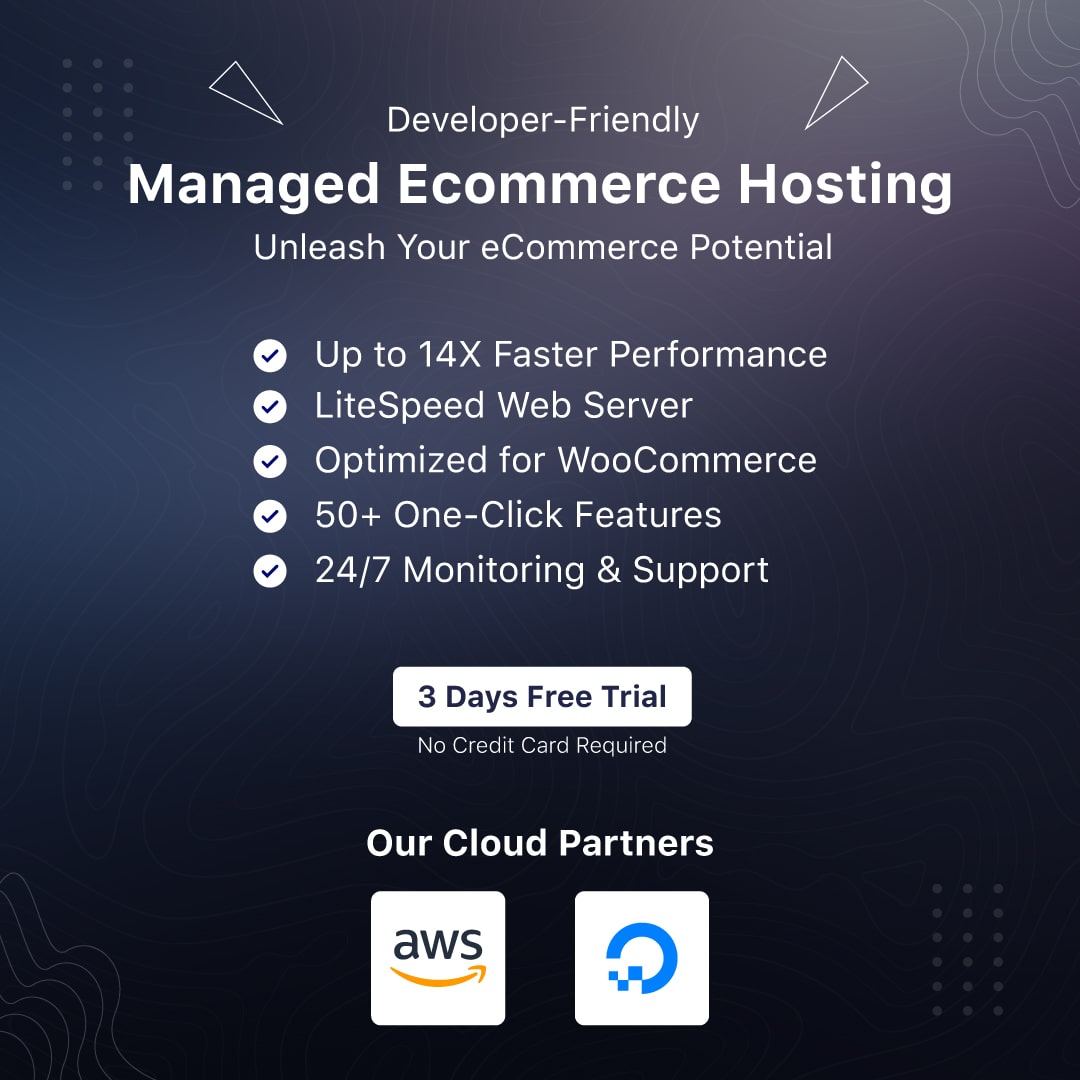
How Ecommerce Site Search Tools Can Provide You a Strategic Benefit
A flawless search experience is essential for increasing sales and consumer happiness in today’s fast-paced e-commerce world. Investing in excellent Ecommerce Site Search Tools is important since consumers depend more on searching to locate things quickly. A strong site search tool can greatly help in turning visitors into buyers. We’ll discuss the top Ecommerce Site Search Tools of 2024 in this guide, focusing on their prominent characteristics, advantages, and cost structures. We’ll also explore professional advice and techniques for search engine optimization, guaranteeing an effortless customer experience that increases conversions and positions of your e-commerce store. Find the best Ecommerce Site Search Tools to improve the search engine optimization of your online store.
Benefits of Using Site Search Tools for Your Online Store
Adding site search features to your online store can significantly impact your buying experience and your business’s profitability. You can boost conversions and sales and foster client loyalty by giving customers a powerful and user-friendly search function.

Here are five key benefits of using ecommerce search tools for your online store:
Enhanced Conversions by Related Outcomes
Customers are more likely to find the product they’re seeking and purchase when you use site search tools to provide them with relevant and customized search results. Site search methods can give precise and customized results by analyzing user actions and preferences using advanced techniques and artificial intelligence (AI).
Improved Customer Experience Through Enhanced Navigation
A well-designed site search function can significantly improve overall customer reviews by providing a seamless and intuitive navigation process. By allowing customers to quickly and easily find what they’re looking for, you can reduce frustration and bounce rates while increasing customer satisfaction and loyalty.
Enhanced Product Discovery Through Faceted Search
A crucial component of many website search engine functions is split search, which allows users to filter search results according to particular criteria like brand, category, and price. Customers can explore and locate similar items that they couldn’t have otherwise found thanks to this feature, which improves product discovery.
Increased Average Order Value Through Recommendations
Site recommendation engines that are integrated into many site search tools make recommendations for relevant products to users based on their browsing patterns and keywords searched. You may raise average order value, increase sales, and enhance revenue by utilizing these suggestions.
Valuable Insights Through Analytics and Reporting
Advanced statistical and reporting features are frequently included with site search engines, offering useful information about user behavior, search trends, and conversion rates. You may enhance the entire consumer experience, optimize your item’s offerings, and improve your search engine function by utilizing these valuable insights.
| S. No. | Names | Pricing | Best For | Free Version |
| 1 | Algolia | Starts at $1 per 1,000 search requests/month | Fast and AI-powered search for large-scale eCommerce stores | Free tier available (limited usage) |
| 2 | ElasticSearch | Free (Open Source) or Paid (starting at $16/month for managed services) | Businesses needing flexible, scalable search with self-hosting options | Open-source version available |
| 3 | Searchspring | Custom pricing (based on features and traffic) | Merchants needing personalization and advanced search analytics | No free version |
| 4 | Klevu | Starts at $499/month | AI-driven product discovery for mid to large eCommerce stores | No free version |
| 5 | Swiftype | Starts at $79/month | Small to mid-sized businesses needing simple yet powerful search solutions | Free trial available |
| 6 | Doofinder | Starts at $35/month | Small to mid-sized eCommerce stores looking for an easy search implementation | Free version (limited features) |
| 7 | Findify | Custom pricing based on traffic and features | Personalized search for mid-sized to large businesses | No free version |
| 8 | Pimcore | Free (Open Source) or Enterprise pricing (custom) | Businesses needing a unified data management and search platform | Open-source version available |
Top Ecommerce Site Search Tools in 2024
In 2024, ecommerce site search tools have become more advanced, playing a critical role in enhancing the online shopping experience. The right search tool not only improves product discoverability but also boosts conversion rates by delivering highly relevant results. Top ecommerce site search tools now incorporate AI, machine learning, and natural language processing to understand user intent and provide personalized results.
As competition intensifies, selecting the best tool tailored to your business needs can significantly impact customer satisfaction and sales. This guide explores the top ecommerce site search tools in 2024, highlighting their key features, benefits, and use cases.
Algolia
Algolia is a top-tier ecommerce site search solution known for its speed and precision. It provides a hosted search API that supports fast and accurate search experiences for various online retailers. By delivering instant results, handling typos, and suggesting relevant products, Algolia ensures users find what they’re looking for quickly and efficiently.

Key Features
- Real-Time Search: Instant results as users type.
- Typo-Tolerance: Handles misspellings.
- Predictive Search: Suggests relevant products.
Benefits
Algolia’s speed and accuracy significantly enhance user experience, making it ideal for mid to large-sized businesses seeking a high-performance search tool. Retailers like Lacoste use it to drive higher conversions.
ElasticSearch
ElasticSearch is an open-source search engine renowned for its scalability and robust search capabilities, built on Apache Lucene. It excels at handling complex queries and large data volumes, making it a versatile choice for enterprises.
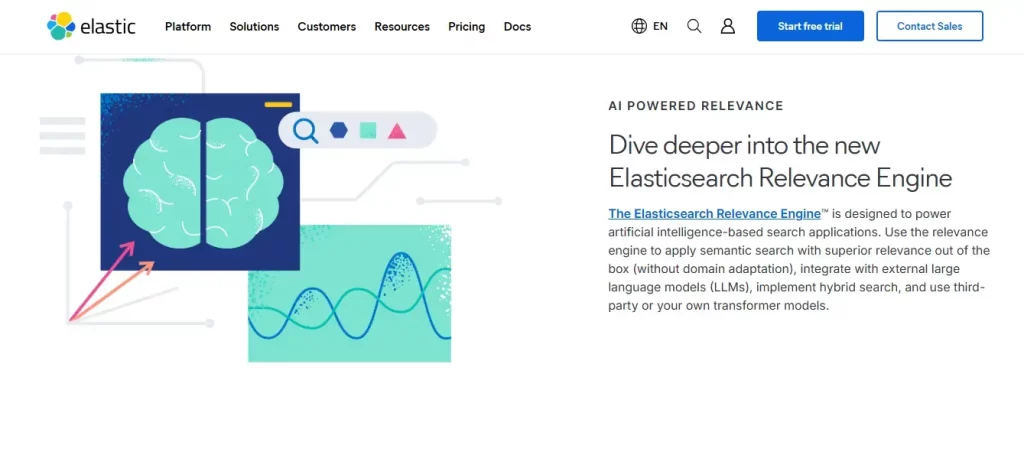
Key Features
- Full-Text Search: Supports complex queries.
- Faceted Search: Filters results by multiple attributes.
- Scalability: Manages large data and high traffic.
Benefits
ElasticSearch’s flexibility and scalability suit tech-savvy businesses with extensive catalogs. Companies, like eBay, leverage its capabilities for powerful and scalable search solutions.
Searchspring
Searchspring specializes in ecommerce search and merchandising tools, offering features designed to optimize the search experience. It provides a suite of tools that enhances search functionality and merchandising strategies.
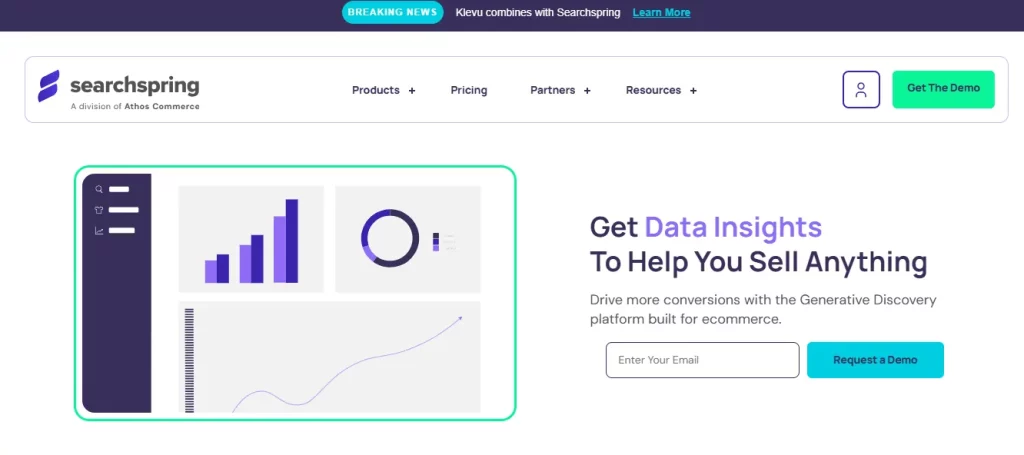
Key Features
- Merchandising Tools: Customizes search results.
- Dynamic Filters: Refines search results.
- Advanced Reporting: Insights into search performance.
Benefits
Searchspring’s tools enhance user experience and drive conversions, making it suitable for mid to large-sized retailers. Brands like RVCA utilize it to boost search effectiveness.
Klevu
Klevu offers an AI-powered site search solution that improves search accuracy and user engagement. Its machine learning capabilities help interpret and understand user queries for better search results.
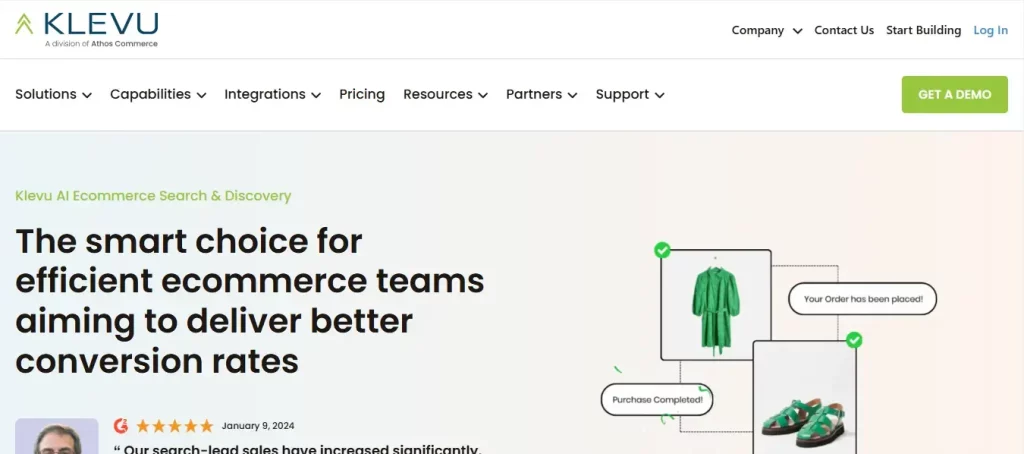
Key Features
- AI-Driven Search: Uses machine learning.
- Intuitive Analytics: Detailed performance insights.
- Easy Integration: Works with various platforms.
Benefits
Klevu’s AI-driven approach enhances search relevance and user engagement. Businesses like Fly London use Klevu for a more accurate search experience.
Swiftype
Swiftype offers a user-friendly search solution with advanced algorithms and real-time indexing. It is designed to deliver relevant search results and provide actionable insights into search performance.

Key Features
- Powerful Algorithms: Delivers relevant results.
- Real-Time Indexing: Up-to-date search results.
- Analytics: Insights into user behavior.
Benefits
Swiftype’s easy-to-use search functionality and real-time updates make it ideal for small to medium-sized businesses. Companies like Adobe benefit from its reliable search capabilities.
Doofinder
Doofinder enhances ecommerce site search with features like real-time suggestions and advanced filtering. It provides personalized search results based on user behavior and preferences.

Key Features
- Real-Time Suggestions: Relevant suggestions as users type.
- Advanced Filters: Refines search results.
- Personalized Results: Based on user behavior.
Benefits
Doofinder’s advanced features improve search efficiency and personalization, making it suitable for businesses aiming to boost user engagement. Brands like Lush use Doofinder for enhanced search functionality.
Findify
Findify provides an AI-driven search solution with personalized recommendations and easy integration. It enhances search accuracy and user engagement through tailored product suggestions.

Key Features
- AI-Driven Search: Enhances accuracy.
- Personalized Recommendations: Based on user behavior.
- Easy Integration: Works with various platforms.
Benefits
Findify’s AI and personalization features improve user engagement and increase sales. Retailers like Arket use Findify to enhance their search functionality.
Pimcore
Pimcore offers a unified search solution integrated with its digital experience management platform. It combines search capabilities with other Pimcore solutions for a comprehensive digital experience.

Key Features
- Unified Search: Integrates with Pimcore solutions.
- Advanced Filtering: Refines search results.
- Integration: Comprehensive digital experience.
Benefits
Pimcore’s unified search and integration make it ideal for businesses using its platform for digital experience management. Companies like Zegna leverage Pimcore to enhance their search capabilities.
Criteria for Choosing Ecommerce Site Search Tools
When selecting an ecommerce site search solution, consider the following criteria.
Relevance and Accuracy
When selecting an ecommerce site search solution, one of the most critical criteria to consider is the tool’s ability to deliver precise and relevant search results. An effective search engine should go beyond basic keyword matching and leverage advanced algorithms that understand and process natural language queries. Additionally, it should handle common issues like misspellings, synonyms, and variations in phrasing, ensuring that users are presented with the most relevant products or content.
A robust search tool should also continuously refine its relevance through machine learning, improving over time as it gathers more data on user behavior. By prioritizing relevance and accuracy, you can significantly improve the overall shopping experience on your ecommerce site.
Speed and Performance
The speed and performance of your ecommerce site are directly linked to user experience and overall site effectiveness. A slow or unresponsive search function can quickly frustrate users, leading to a negative shopping experience and potentially resulting in abandoned carts.
In today’s fast-paced digital environment, users expect instant results, and any delay can decrease their engagement. Therefore, it is essential to choose a search tool that offers fast response times, ensuring that users can find what they’re looking for without any frustrating delays.
Integration Capabilities
Seamless integration is a crucial factor when selecting an ecommerce site search solution. Your chosen tool must work smoothly with your existing technology stack, including your ecommerce platform, content management system (CMS), customer relationship management (CRM) tools, and analytics platforms.
Proper integration ensures that the search tool can leverage data from various sources to deliver a more personalized and relevant search experience. For instance, integration with your CMS might allow the search engine to index and retrieve content from your site’s blog or product pages, while integration with your CRM can enable personalized search results based on past user interactions.
Customization and Flexibility
Customization and flexibility are key when choosing an ecommerce site search tool, as they allow you to tailor the search experience to meet the specific needs of your business and customers. A customizable search engine provides options to modify various aspects of the search experience, such as ranking algorithms, filters, and the user interface.
Additionally, flexibility in design and layout allows you to align the search interface with your brand’s look and feel, creating a cohesive experience.
Analytics and Reporting
Analytics and reporting capabilities are essential features of any effective ecommerce site search tool. These functionalities provide invaluable insights into how users interact with your search engine, allowing you to understand what’s working and where improvements are needed.
Detailed analytics can reveal patterns in search queries, showing which products are most frequently searched for, as well as identifying any gaps in your inventory where users may not be finding what they need. This data can inform inventory management decisions and guide the development of new products or content.
How to Implement and Optimize Ecommerce Site Search
Selecting the appropriate ecommerce site search tool involves evaluating several critical factors to ensure it meets your business needs.
- Key considerations include search relevance, which determines how accurately the tool returns relevant results based on user queries.
- performance, which affects the speed and efficiency of search responses.
- integration capabilities, which ensure the tool works seamlessly with your existing ecommerce platform and other technologies.
- customization options, which allow you to tailor the search experience to fit your specific requirements.
- Assess how well the tool aligns with your business goals, such as improving user experience or increasing conversion rates.
Additionally, consider the tool’s scalability to accommodate future growth and its support and maintenance requirements. A thorough evaluation of these aspects will help you choose a search solution that enhances your ecommerce site’s functionality and overall effectiveness.
Implementation Best Practices
When implementing an ecommerce site search tool, start by defining your specific requirements. Determine whether you need features like real-time search results, advanced filtering options, or personalized recommendations to meet your business objectives.
Next, select a solution that is compatible with your existing eCommerce platform and integrates smoothly with your other technologies. Compatibility ensures that the search tool works effectively within your current infrastructure without causing disruptions.
A reliable ecommerce hosting platform makes integration effortless, keeping everything connected and running without slowdowns—so your store stays fast, efficient, and hassle-free.
Thorough testing is essential to verify that the search functionality performs as expected under various conditions. Test for accuracy, speed, and reliability to ensure that the tool delivers a positive user experience. Proper implementation, aligned with your defined requirements, will set a solid foundation for optimizing your site search capabilities.
Optimization Tips
To optimize your ecommerce site search, start by refining search algorithms based on user feedback and analytics. Regularly review and adjust algorithms to improve the relevance and accuracy of search results, ensuring that they meet evolving user expectations. Enhance the user experience by incorporating features like autocomplete, which helps users complete their queries more efficiently; advanced filters, which allow users to narrow down their search results; and sorting options, which help users find products based on specific criteria.
These enhancements make the search process more intuitive and user-friendly. Additionally, continuously monitor search performance using analytics tools to track key metrics such as search speed, accuracy, and user engagement. Identifying issues and leveraging data-driven insights will help you make informed improvements, ensuring that your site search remains effective and responsive to user needs.
Conclusion
Effective ecommerce site search tools are crucial for providing a seamless and enjoyable shopping experience. Selecting the right search solution and applying best practices can significantly enhance search functionality, boost user engagement, and increase conversion rates. Assess your current site search capabilities and consider upgrading to a more advanced tool if needed.
Prioritize factors such as search relevance, performance, integration with existing systems, and customization options to choose the best solution for your needs. Investing in a robust site search tool will ultimately drive greater success for your ecommerce business.
FAQs
What is faceted search?
Faceted search is also known as faceted navigation or faceted browsing. It allows site searchers to quickly sort and organize search results to find what they’re looking for.
What is semantic search?
Semantic search is a data searching technique that focuses on understanding the contextual meaning and intent behind a user’s search query, rather than only matching keywords.



